Overview
- Description
- Interview with Henry and Gita Baigelman in Queens, NY by Bret Werb regarding DPs.
- Date
-
Recorded:
1999 January 23
- Contributor
-
Performer:
Henry C. Baigelman
Interviewer: Bret Werb
- Biography
-
Henry Chaim Baigelman was born on July 12, 1911, in Łódź, Poland, to Szyman and Rifka. He had a brother David, a composer and conductor, born in March 1887, two other brothers, a sister Rose, and three other sisters. A Polish-Jewish family, they attended synagogue, observed major holidays, and spoke Polish and Yiddish at home. Henry attended shul every Saturday, and received his secular education at a public Polish Gymnasium. They were a family of professional musicians. When Henry was 6, his brother-in-law, Samuel, taught him to play the violin. He joined a conservatory and at 15 began playing both the violin and the saxophone professionally. Szyman died in 1939, before the war started.
On September 1, 1939, Germany invaded Poland. When the bombing began, the Baigelman men fled the city and hid in a field to avoid being caught and sent to a labor camp. Henry promised his mother that he would return that same day and he did. By September 8, the German army occupied Łódź and established a sealed ghetto. Henry, Rifka, David, a younger brother, Rose, her daughter, and extended family members were forced to move into a two room apartment in the ghetto. Henry worked in a kitchen and at a factory that manufactured hats for German soldiers. The administrative head of the ghetto, Mordechai Chaim Rumkowski, established the House of Culture where the Łódź ghetto orchestra performed twice per week; David was the conductor and Henry played the violin.
After Rose died of a brain tumor around 1942, Rifka and Henry cared for her daughter. On June 10, 1944, Heinrich Himmler ordered the destruction of the ghetto. David hid the family instruments, including Henry’s violin, in a factory attic. On August 4, 1944, Henry and 23 family members were deported to Auschwitz concentration camp. They took what they could carry and were forced into covered cattle cars for an overnight ride. Upon arrival, the men, women, and children were separated. Henry was stripped, shaved, disinfected, and given a prison uniform and shoes. He shared a bed with 3 others and did not work. Henry saw the crematoriums, but only heard rumors as to their purpose.
On August 18, Henry was transported to Kaltwasser concentration camp in Germany in a closed cattle car. The prisoners could see people standing along the tracks, watching the train. He arrived on August 21 and was placed in a barracks with 500-600 prisoners. There was no sanitation or toilets, and many were ill. Henry worked building highways for 14 hours a day, 6 days a week; his rations were a small piece of bread and soup each day. In November 1944, he was transported to Flossenberg concentration camp and assigned to hard labor. In February 1945, there was a typhus outbreak in sub-camp Altenhammer and the sick were brought to the hospital at Flossenberg. Henry, his nephew, and 2 cousins were among those selected to replace them. In Atlenhammer, Henry met the camp supervisor, a German political prisoner. He had a violin and accordion and he made Henry and his cousin play daily for him. In return, Henry was well fed and had extra food to share with friends.
On April 16, the German soldiers and guards vacated the camp. The prisoners, having nowhere to go, stayed behind. They found food and ate. After two days, the Germans returned and on April 20, decided to evacuate the camp by ordering a forced march of 12,000 prisoners. They marched at night and hid in orchards during the day. There was no food and they slept in the snow with one blanket. If a prisoner did not get up, he was shot. On April 23, Henry could not get up; his nephew and a friend carried him until he could walk on his own. They were liberated that night by the United States Army. Only 3,000 prisoners survived. The soldiers gave the liberated prisoners milk and food.
Henry and four others found a farm and the farmer provided food and shelter. After a few weeks, they left for the American controlled city of Cham, Germany, and were provided with living accommodations. Henry and two nephews were the only survivors from his immediate family of twenty-three people. While in Cham, Henry met seven other musicians from Łódź. An American army captain and the Cham Burgermeister helped Henry organize an orchestra. Henry procured instruments from Czechoslovakia. His brother-in-law had retrieved the family instruments from the Łódź ghetto following its liberation by the Soviet Army on January 19, 1945. Henry also visited a textile factory and had suits tailor made for performances. The group named themselves the Happy Boys. They specialized in American jazz and performed for American troops. Henry contacted the United Nations Relief and Rehabilitation Administration (UNRAA), which administered displaced persons camps. UNRAA provided the group with an ambulance and driver. They converted it into a tour bus and performed at displaced persons camps and concert halls in large German cities. The Happy Boys were known for their mix of prewar hits, easy listening classics, Jewish songs, and original works about the lives and concerns of Jewish displaced persons. While touring in 1947, Henry married Gita Glazer. The couple had met in Łódź in 1939. The Happy Boys played together for four years.
In 1949, Henry and Gita decided to leave Germany. Emigration to the United States was difficult and the couple decided to go to Israel. As they were making preparations, the quota opened for visas to the US. On August 9, they emigrated to New York from Cham on the USS General Haan. The couple had 2 children. Henry died on June 2, 2002, at the age of 90.
- Format
- Audiocassette; magnetic
Physical Details
- Language
- English
- Genre/Form
- Oral histories.
Rights & Restrictions
- Conditions on Access
- You do not require further permission from the Museum to access this archival media.
- Copyright
- Copyright Undetermined
- Conditions on Use
- Owner of copyright, if any, is undetermined. It is possible this is an orphan work. It is the responsibility of anyone interested in reproducing, broadcasting, or publishing content to determine copyright holder and secure permission, or perform a diligent Fair Use analysis.
Administrative Notes
- Legal Status
- Permanent Collection - not accessioned
- Recorded Sound Provenance
- Since 1992, the United States Holocaust Memorial Museum's music historian has collected historic sound recordings, published materials, interviews, and music related to the Holocaust and World War II.
- Recorded Sound Notes
- “The Happy Boys" was a troupe of musician-survivors of the Lodz ghetto who toured DP Camps throughout the American Zone of Occupation during the early postwar years. "Happy Boys" director Henry Baigelman was a friend of the USHMM, and in 2010, he donated a collection of memorabilia from his estate (https://collections.ushmm.org/search/catalog/irn40185).
- Recorded Sound Source
- Bret Werb
- Record last modified:
- 2024-02-21 07:29:22
- This page:
- https://collections.ushmm.org/search/catalog/irn600225
Also in Music study collection
Various audio cassettes, CDs, and LPs containing original sound recordings, published materials, interviews, or music obtained by the United States Holocaust Memorial Museum's curator of music.

Days of Remembrance 1986
Recorded Sound
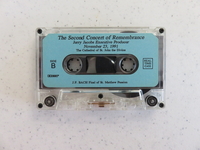
The Second Concert of Remembrance
Recorded Sound
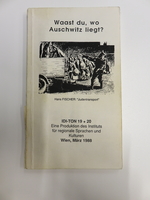
Waast du, wo Auschwitz liegt?
Recorded Sound
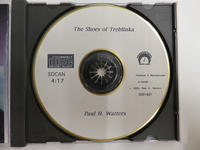
The Shoes of Treblinka
Recorded Sound

Austria's Musical Exodus in Operetta and Song
Recorded Sound

We Are Here: Songs of Remembrance, Hope and Celebration
Recorded Sound

The Last Butterfly -- Lucas Richman
Recorded Sound
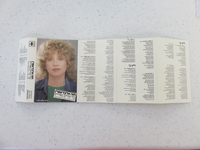
Od Shirim Beyiddish
Recorded Sound
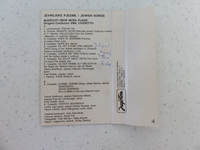
Jewish Songs
Recorded Sound

Poeme Juif
Recorded Sound
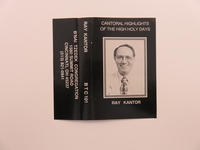
Cantoral Highlights of the High Holy Days
Recorded Sound
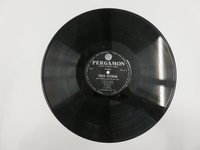
Yevgenii Yevtushenko Recites Poems
Recorded Sound
Songs from Dunawerke & Vilna
Recorded Sound
Buchenwald and Sachsenhausen Camp Songs - Jurmann
Recorded Sound
Eva Golgevit interview
Recorded Sound
To Denmark "The Legend"
Recorded Sound
Baron Von Der Shpik | Two Friends
Recorded Sound
Das Dritte Reich In Dokumenten
Recorded Sound
Ich tanze mit dir In den Himmel hinein / Traumhafte Tonfilme
Recorded Sound
I Know Why | Chattanooga Choo Choo
Recorded Sound
Werner Helwig - Lieder
Recorded Sound
Berliner Komponistenportrat 2
Recorded Sound
15 Erfolgsnummern aus den Jahren 1928-1934
Recorded Sound
Symphony No. 13
Recorded Sound
Elie Wiesel: Reading from His Works
Recorded Sound
Songs of Martyrdom and Hope
Recorded Sound
Henny Durmashkin: Songs to Remember
Recorded Sound
Jura Soyfer – Verdrängte Jahre
Recorded Sound
Hudba psaná v Terezíně
Recorded Sound
Iddische Lieder
Recorded Sound
Yizkor: In Memory of Six Million
Recorded Sound
Nehama Lifschitz: In Concert - Tel Aviv and Jerusalem 1969
Recorded Sound
Kantikas Di Mi Nona
Recorded Sound
Z'emiroth Ashkenaz
Recorded Sound
A Manifesto of Belief in Man
Recorded Sound
Le chant de la libération | Le Temps Des Cerises
Recorded Sound
The Jewish Song
Recorded Sound
More Sephardic Songs: Memories of Sarajevo
Recorded Sound
Śpiewa
Recorded Sound
A Victory Day
Recorded Sound
Stärker Als Flammen
Recorded Sound
Songs of the Great Patriotic War
Recorded Sound
The Great Patriotic War 1941-1945
Recorded Sound
Concentration Camp Horrors
Recorded Sound
Cantemos
Recorded Sound
Songs of the Gerer Chasidim
Recorded Sound
Lest We Forget: Memorials from Traditional Hebrew Liturgy
Recorded Sound
Dievs, sveti Latviju | Karoga Dziesma
Recorded Sound
Jojne Karabin w koszarach | Jojne Karabin—nominacja
Recorded Sound
Dark is the Night | Odessa Kostia
Recorded Sound
Blue Handkerchief | Sing, Play, Accordion
Recorded Sound
Songs of the Ghetto
Recorded Sound
Ana Vinocur: Songs of the Ghetto and Jewish Folklore
Recorded Sound
Dies Irae (Auschwitz Oratorium)
Recorded Sound
The Survivors' Suite
Recorded Sound
Oratorium Oświḙcimskie
Recorded Sound
Singapore | The Happy Harry
Recorded Sound
100 Jahre deutsches Arbeiterlied
Recorded Sound
Szopka w Dachau
Recorded Sound
Songs from the Depths of Hell
Recorded Sound
Majakowski Eisler Lieder
Recorded Sound
Der Deutschen Freiheit Morgengruss
Recorded Sound
Canciones de las Brigadas Internacionales
Recorded Sound
Erich Weinert: Rote Lieder Rote Gedichte
Recorded Sound
The Terezin Project: Children's Opera Brundibár
Recorded Sound
Yankele Nel Ghetto. Klezroym
Recorded Sound
Ludmilla Berkwic: Piano
Recorded Sound
Elliot Schwartz: Tapestry
Recorded Sound
Kaddish For Terezin (Holocaust Requiem)
Recorded Sound
In Auschwitz Lager Binlkh Nit Geven
Recorded Sound
Crystal Psalms
Recorded Sound
Songs of Bellevue
Recorded Sound
Songs of Tradate
Recorded Sound
Anatol Vieru: Memorial
Recorded Sound
Shoa Cycleanon
Recorded Sound
An Afternoon in Black and White
Recorded Sound
Hasidic Overture for String Quartet -- Lionel Semiatin
Recorded Sound
No More in Thrall
Recorded Sound
The Past Is Present
Recorded Sound
In Memoriam Anne Frank
Recorded Sound
"The Pain of Babi Yar" and other pieces
Recorded Sound
Songs of the Holocaust: A Commemorative Lecture Recital
Recorded Sound
The Last Butterfly -- Meira M. Warshauer
Recorded Sound
Warsaw Ghetto: Holocaust and Resistance
Recorded Sound
113 Songs from Lidice Survivors
Recorded Sound
Eisikovits Recital
Recorded Sound
Emil Gorovets: Gebirtig poetry
Recorded Sound
Moshe Mataraso interview
Recorded Sound
The Emperor of Atlantis performed in Israel
Recorded Sound
Alberto Nar Interview and Songs
Recorded Sound
Joseph Gefanue Testimony
Recorded Sound
Yankl Herszkowicz Der Zinger Fun Lodzher Geto
Recorded Sound
Chamber Music and Poetry on Themes of the Holocaust
Recorded Sound
Four Songs from the Holocaust
Recorded Sound
Sami Profetta Testimony
Recorded Sound
Sylvia Glickman: Am I a Murderer?
Recorded Sound
Can Heaven Be Void?
Recorded Sound
Three Scenes from The Lost Childhood Yehuda Nir
Recorded Sound
The Holocaust Suite
Recorded Sound
String Quartets and Music for solo viola
Recorded Sound
Can This Be Man? A Music Drama for Violin and Orchestra
Recorded Sound
Radio L'Chayim broadcast: Brundibar
Recorded Sound
Curtis Institute of Music
Recorded Sound
Music of Erich Frost
Recorded Sound
Song nr. 29
Recorded Sound
Interview with Erich Frost
Recorded Sound
Liebster sings a Jehovah's Witness song
Recorded Sound
Erich Frost's songs and interview
Recorded Sound
Jehovah Witnesses Music: Kusserow Family Recording
Recorded Sound
Elfriede Löhr Sings Psalm 126
Recorded Sound
Morning Edition: Music from Theresienstadt/Basco
Recorded Sound
The Emperor of Atlantis (translation by Aaron Kramer)
Recorded Sound
Terezin: Prisoner art and Nazi Myth-making
Recorded Sound
The Emperor of Atlantis - Interview and Songs
Recorded Sound
Music of Terezin
Recorded Sound
Songs from Terezin
Recorded Sound
Songs composed by Erich Frost by Sister Greey
Recorded Sound
Interview with Stefan Moise
Recorded Sound
Leo Spellman interview
Recorded Sound
Henry Baigelman interview
Recorded Sound
Facing History and Ourselves Lecture: SH'MA
Recorded Sound
Makh tsi di eygelekh
Recorded Sound
Interview with Joel Rubin
Recorded Sound
Helen Yermus sings Kovno Ghetto songs
Recorded Sound
Interview with Sima Skurkovich
Recorded Sound
Interview with Alberto Nar on Thessaloniki
Recorded Sound
Hasha Fisher Sings | Henry Baigelman interview
Recorded Sound
Gita Baigelman interview
Recorded Sound
Krakonovski Interview
Recorded Sound
Interview with Leah Suirski
Recorded Sound
Interview with Norman Salsitz
Recorded Sound
Tsores un layd
Recorded Sound
Finsternish
Recorded Sound
Masha Rolnik sings
Recorded Sound
Songs from Sobibor
Recorded Sound
Songs from Auschwitz, Ravensbruck, Birkenau part 1
Recorded Sound
Interview with Inge Lammel
Recorded Sound
Inge Lammel
Recorded Sound
Kovno Ghetto Songs (1994)
Recorded Sound
Max Hollweg sings camp song
Recorded Sound
Russian lullaby
Recorded Sound
Esther Sendrowicz sings 6 songs
Recorded Sound
Liliane Kaczerginski
Recorded Sound
Henny Durmashkin sings
Recorded Sound
Oral history interview with Miriam Hoffman
Recorded Sound
Interview with Regina Palatizki
Recorded Sound
Greek Partisan Songs (1941-1944)
Recorded Sound
Partisan Songs
Recorded Sound
Oh Zwangsarbeit
Recorded Sound
La Rafle du Vel d'Hiv
Recorded Sound
Mitternachtssohne: Beer, Nice 1999
Recorded Sound
Edvard Polidi and Anna Gourrfinkel concert
Recorded Sound
Yiddish Folk Songs 1968
Recorded Sound
Ozier Kawka: Chants en Yiddish
Recorded Sound
Entretien avec Avrom Sutzkever
Recorded Sound
Concert in the old school Garrett
Recorded Sound
Mendel Flaster Sings
Recorded Sound
Yiddish Poems & Songs from the Holocaust
Recorded Sound
Interview with Krystyna Tarasiewicz
Recorded Sound
Songs from Majdanek
Recorded Sound
Esther Sendrowicz sings 4 songs
Recorded Sound
Ruth Rubin collection -- Sh. Kacerginski recordings
Recorded Sound
Performance Today - Music from Terezin
Recorded Sound
Badkhn repertory of Simcha Friedman
Recorded Sound
Survivors Julio and Nusha Gotlib in Buenos Aires
Recorded Sound
Der Friedensclown. Wolf Biermann
Recorded Sound
Songs of My People | Nahal Songs
Recorded Sound
Songs of the Ghettos
Recorded Sound
Folk Songs from the Warsaw Ghetto
Recorded Sound
Roma Songs
Recorded Sound
Belina and Siegfried Behrend - Yiddish songs
Recorded Sound
Songs of Survivors of Saloniki
Recorded Sound
Songs to Remember (Ghetto Songs)
Recorded Sound
Louis Danto: Excerpts from Other Albums
Recorded Sound
Bina Landau – From Russia to Israel. B'shira u'b'Zimra.
Recorded Sound
Beth Abraham Youth Chorale sings works by Charles Davidson
Recorded Sound
Ghetto Songs Sung by Survivors
Recorded Sound
Songs and Tunes from the Ghetto
Recorded Sound
Belina Sings in D.P. Camps
Recorded Sound
Songs from the Ghetto
Recorded Sound
Yiddish Folk Songs Sung by Ruth Rubin
Recorded Sound
A Memorial to the Victims of War
Recorded Sound
Rinat Israel Chamber Choir: Folk Songs - A capella
Recorded Sound
The Two Worlds of Seymour Schwartzman
Recorded Sound
Bialystok in America
Recorded Sound
Jiddische Lieder. Peter Rohland. Un der Rebbe singt.
Recorded Sound
Cantorial and Jewish Folk Songs
Recorded Sound
Roma Melodies Performed by Roma Violinist Stefan Moise
Recorded Sound
If The World Had Cried
Recorded Sound
Dos Yidishe Lid fun Nekhtn un fun Haynt
Recorded Sound
Jewish Songs
Recorded Sound



